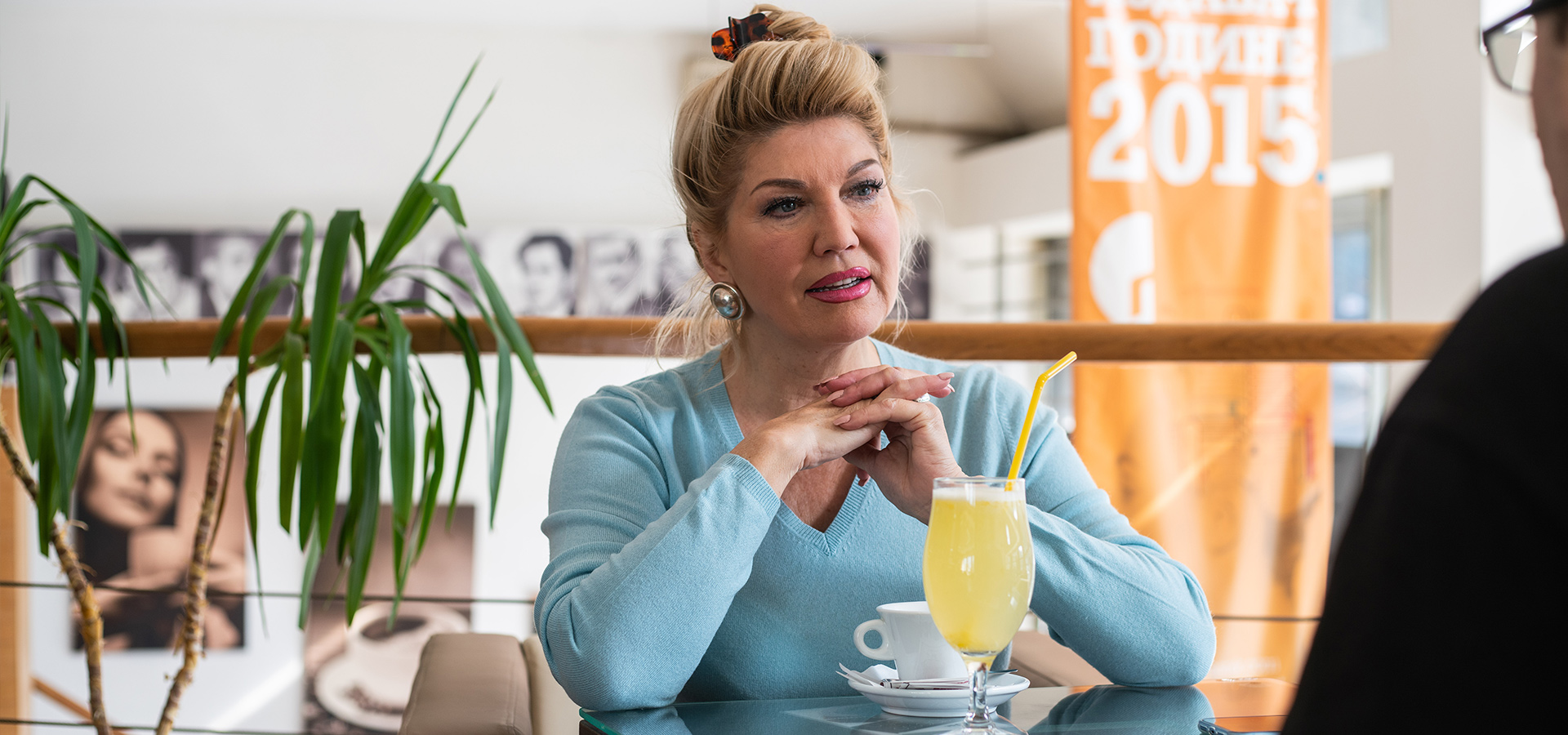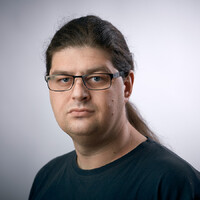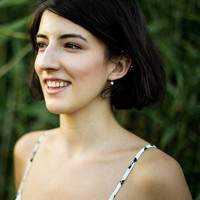Suzana Mancic: the Lotto girl who never gives up
There aren’t many media celebrities who can take a break and then return and shine even brighter than ever before. One of such personalities is absolutely our most famous ‘Lotto girl’ Suzana Mancic who gained the attention of the audience with her work and charisma and remained a recognizable face for young and old.
She began her career as a singer, but her restless spirit and her desire to explore and push the limits brought her into the world of television, show-hosting, acting and writing.
You’ve been a part of the media world since birth.
My father was a journalist for the “Borba” newspaper when I came into the world. I spent the first six years of my life in the building leaning on “Borba” building, in a communal apartment that we shared with several other people, intellectuals, who worked for this newspaper. It was a phenomenal salon apartment at the time and I still remember it well. That well that I could draw a picture of how the rooms were distributed and what they looked like.
As the only family with a child, we got to use the largest room. Today it would be called a ‘master bedroom’. It faced towards the street and had its own bathroom, while the kitchen was located on the opposite part of the apartment and looked onto the glass-house that it shared with the office my dad worked in. We’d often wave to each other while he was at work.
Even though I was an only child, I was very disciplined and obedient. In a shared apartment you always had to be quiet. Even when I was crying or celebrating I had to be quiet, so I learned from a young age to be considerate and respectful of others.
How did you come to get the name “Suzana” which was uncommon back in the day?
I was born on the second day of my family’s ‘slava-day’, on Arandjelovdan, November 22nd and everyone thought my name would be Andjelka.
My father wanted to name me “Izeta” after a woman he met while cleaning Kosovo with the Partisans and who impressed him, however my mom had the last word and she named me “Suzana”. When I asked her why, she told me “I gave birth to you in tears”.
The delivery lasted for three days. Belgrade was snowed in and eventually they pulled me out with a forceps. They say that children born that way are either challenged or brilliant. I, evidently, fall into the latter category.
What are your childhood memories?
I used to go to a kindergarten located in Kralja Milana street (then called Marsala Tita) across the way from Putnik building. I remember my caretaker Lala who I loved very much. I had a best friend called Mima and a crush on Biberce who was in love with Mima.
At the time the square of Marx and Engels served as a parking lot and there weren’t any trees. When I was around six years old, my parents sent me to buy sour cream in the nearby Milk restaurant. Back then it was sold in little glass jars and I felt so important going to the store by myself. But my parents were very cautious and they stood on the terrace to see if I was crossing the street properly and watched me from afar.
I also used to play in the Pionir park and I remember a guard who wouldn’t let us step on the grass and pick flowers. We were a bit afraid of him, but we had to listen to him.
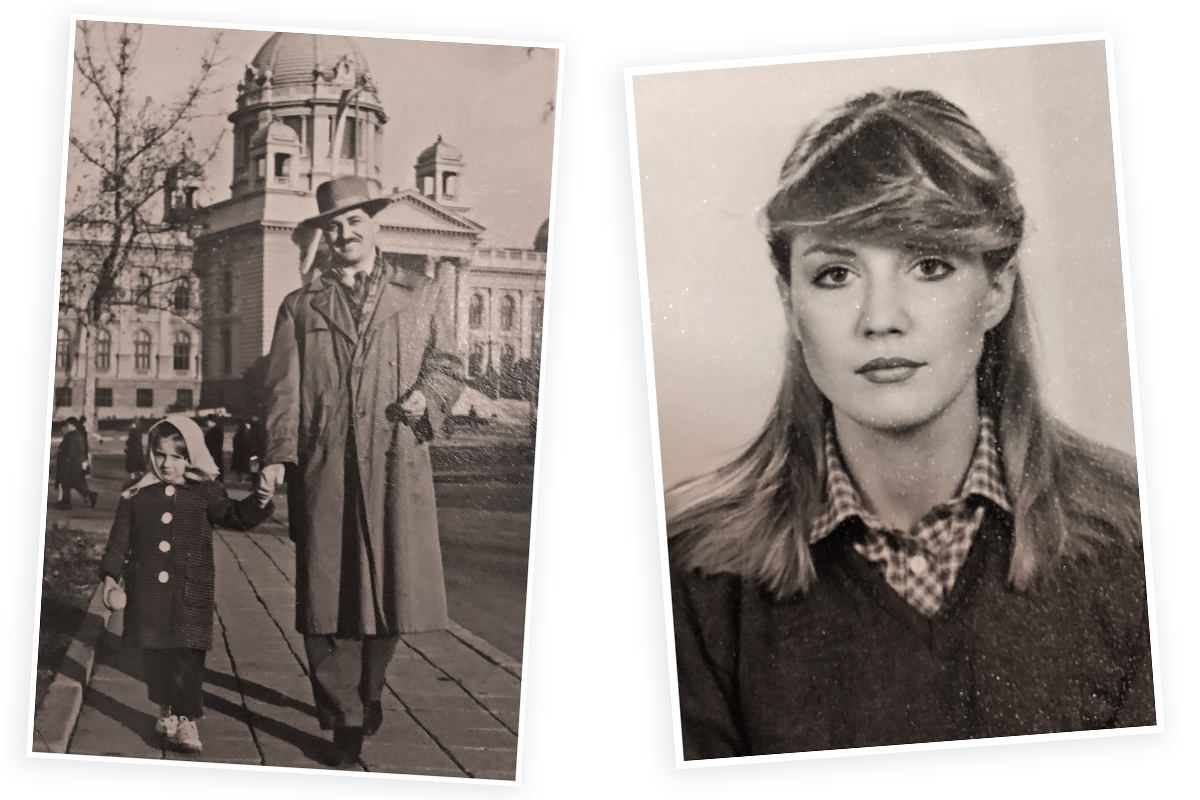
When you started school, you had to move for the first time in your life.
I attended junior school in the Professor colony where we moved after my father started working for “Politika” and got an apartment. It was Djuro Strugar school which at the time was brand new.
What’s interesting is that recently I watched a documentary from 1956 on TV, back when my school was constructed. The movie crew captured a moment when the first generation of students met the mother of war hero and fallen fighter Djura Strugar and that really brought me back to my school days.
I remembered that Djordje Marjanovic used to live there and that we as kids used to flock to him like sparrows on our roller blades when he passed in his “Taunus”.
My parents did everything to hype school for me and make me excited to start, so I couldn’t wait to go.
My dad had some Russian camera and used it to take pictures of the entire morning of my first day of school. He took pictures of me waking up, saying goodbye to my dolls, getting dressed by mom, going to school and getting seated in the front desk next to a boy called Zocko who ended up being my best friend.
It was thanks to that love of school that I became the student of the generation and the president of the student council.
With that kind of success you probably drew a lot of attention to yourself?
I was recruited by the Youth association and the Communist party. At the age of 15 I was suggested for KPJ membership, but I sort of fearfully rejected it saying it would be too much responsibility for me because I was too young.
Alas later on when time came for us to really join the party for the sake of our future and education or employment, I was rejected because I had the best legs in 5th Belgrade high school – confirmed by Mira Karanovic, a school friend of mine who went to a different class.
I wore a skirt that was probably too short for the time and already had appeared on TV as a member of the “Trag” music group.
“Imagine if she was waving a red book” – is what I heard people said later.
And what were your high-school days like?
I was also a star student in high-school. I graduated from 5th Belgrade high-school and only had my grades drop in 2nd grade. I had fallen in love and went a bit crazy but I bounced back soon. It was my first temptation in life – what can you do for yourself.
I went to various school clubs where we acted, sang and had fun so high school was a time of friendship for me as well as discipline and study, so I met people I’m still in touch with today.
In high-school I also tried my first cigarette. I didn’t really like the professor who taught French and Latin, so if I weren’t ready for the class I often skipped class, coming up with various excuses. As it happens I spent all my excuses at one point and I was sure she would question me in her next lesson so right before class in the girls’ bathroom my friend Djina who smoked golden “Pir” told me “Listen Mancic, light a cigarette. You’ll turn green and she’ll let you go herself, but you have to suck it in”. I take the cigarette, light and suck on it. I got halfway through it and said “I can’t take it anymore, even if she gives me an F”.
However, instead of turning green I turned red as a pepper. I really got terribly sick. So much so that the professor let me leave class and I had to miss two days of school.
That’s when I realized smoking wasn’t for me.
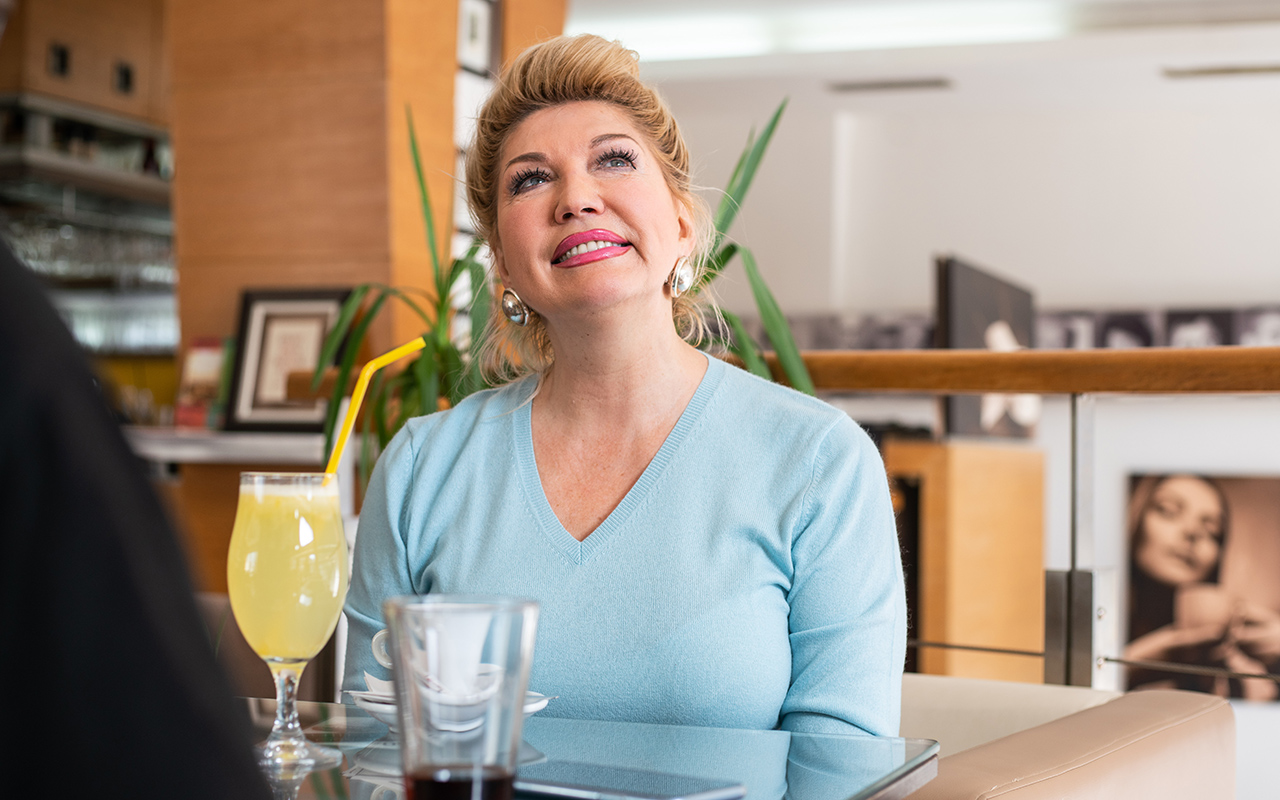
There were no computers and social networks back then. Were friendships different?
We talked and looked each other in the eyes much more. When you look someone in the eyes and talk to them face-to-face you can figure out what kind of person they are and there’s no replacement for that kind of contact.
We spent good times together. Of course we had clans in our grade. There were five of us girls who are still friends today on one end and another clan who were a bit jealous of us on the other. But there were never any real conflicts. We were all good students and all tried just as hard and sometimes skipped lessons together.
We went to school in back in groups. We were constantly chattering, talking about our crushes and love – did he look at me or didn’t he...
Around 3rd grade of high school we started having real boyfriends and crushes turned into relationships and having the boys wait for us after school with their cars. That was the biggest thrill – you’re leaving school with everyone else and then get in the car with your boyfriend. Of course they weren’t any expensive cars – if you had any car back then you were the top dog.
What was dating like?
It was a different time and we went out during the day. Firstly because there wasn’t anywhere to go at night and parents wouldn’t allow it anyway. The main thing to do was gather up loose change and sit in “Sansa” after school. We were the best looking girls there. We’d take off our school aprons, drink coffee and look at passersby and see who was looking back. We would also sometimes go to “Tas” cafeteria which back then was considered a fancy place.
Also Tasmajdan had the most beautiful open skating rink in the world where we’d go all the time and use it as an excuse to go out. On Sundays the “Zeppelin” had a free entrance policy for girls starting at 5PM. We’d tell our parents we were going skating but actually hide mascara in our skating shoes or any other makeup we had. Then we’d leave home, doll up and straight to the disco. We’d go there, dance for an hour or so, boys would approach and we’d have fun. Those were the first outings our parents didn’t know about and they were a great time.
We also loved going to the cinema. I remember when big movies of that time came out like “Ben-Hur” they would play one part of the movie and next month the second. Everyone loved cinema.
So a very different time than it is today?
What was different back then is also that we all wore aprons and we were equals. I don’t remember anyone from my childhood who was considered poor or rich. We were raised to love our friends and help each other.
Here and there someone would have Italian shoes or something like that, but that was rare. My dad would open the closet, look inside and say “You have everything, you don’t need it. When you earn your own money you can buy what you want”. And even though I raged against it, it also drove me to earn my own pocket money as young as 15.
What was your first job?
Because I was a star student, I didn’t have to pass an entrance exam to get into high-school so I had a big summer vacation that year and my eye on a pair of red sandals. In order to make money for them I taught math to kids from the neighborhood and finally earned enough to buy them. It showed me how good it feels when you can afford something for yourself. It stayed with me my whole life and I’ve always been grateful to my parents for that lesson.
Did you know or suspect back then that your career will be in music and scene?
My first singing performance was in junior school Djuro Strugar. On the school holiday I sang Lara’s song with a tamburitza orchestra.
Later in high-school I was a member of the choir. Me and several of my friends were fascinated by the movie musicals such as “Merry Poppins” and “The sound of music” so we made our own musical using melodies from various movies. However we needed a guy to help play the hero role so we hassled a friend of ours called Zivulovic.
Finally we premiered with that musical on stage at our high-school.
There was actually a genetic component to my love for music. My father was fantastic at the violin and supported himself playing while he was a student and my mother was a brilliant mezzo-soprano. The entire Mancic family is very musical. Whenever we’d have a family gatherings, they’d split their voices and sing and I would listen to them in awe and certain that I had no ear for music.
However in 2nd year of high school I fell in love for the first time with a guy who played music with his friends. One time when we were hanging out and someone was playing a guitar, I sang a bit louder than usual and our friend Graca heard me, stopped and said “Dzudzo (that’s what he called my boyfriend), that kid can sing”. And that’s how our band “Trag” came to be. We were acoustics and tried to walk in the steps of “S vremena na vreme”, “Vlada i Bajka”, “Ibrica Jusic”... we rehearsed in Dadovo and made songs for theatre plays. It was all intoxicating to me.
Back then everyone wrote music to go with poems by famous poets so we did that as well using the shortest love poem by Milos Crnjanski “Trag”, which is the name we also gave our group. Even our first record was in the same style. On the one hand there was the song “Grade moj” and on the other “Vagonasi” written for the lyrics by August Cesarec. The song “Grade moj” was so well produced that I still to this day often play when I make guest appearances on shows.
It was a very important period for me. With “Trag” I honed my music talent a bit, learned about harmony, second voice, terca...
More importantly, even though we did amateur work we got symbolic payments here and there. It’s interesting that we would often sign contracts with organizers who paid us something in the value of today’s 20-30eur. Someone valued our work and that meant everything to us.
Soon everyone from the band started asking me “Why do you try to stand out all the time”. I hadn’t been aware of my need to show off, to be main on the stage. At first I took it as an insult, but afterward I realized it was that grain of exhibitionism and ambition that led me through life, to the music scene, TV and eventually to where I am today.
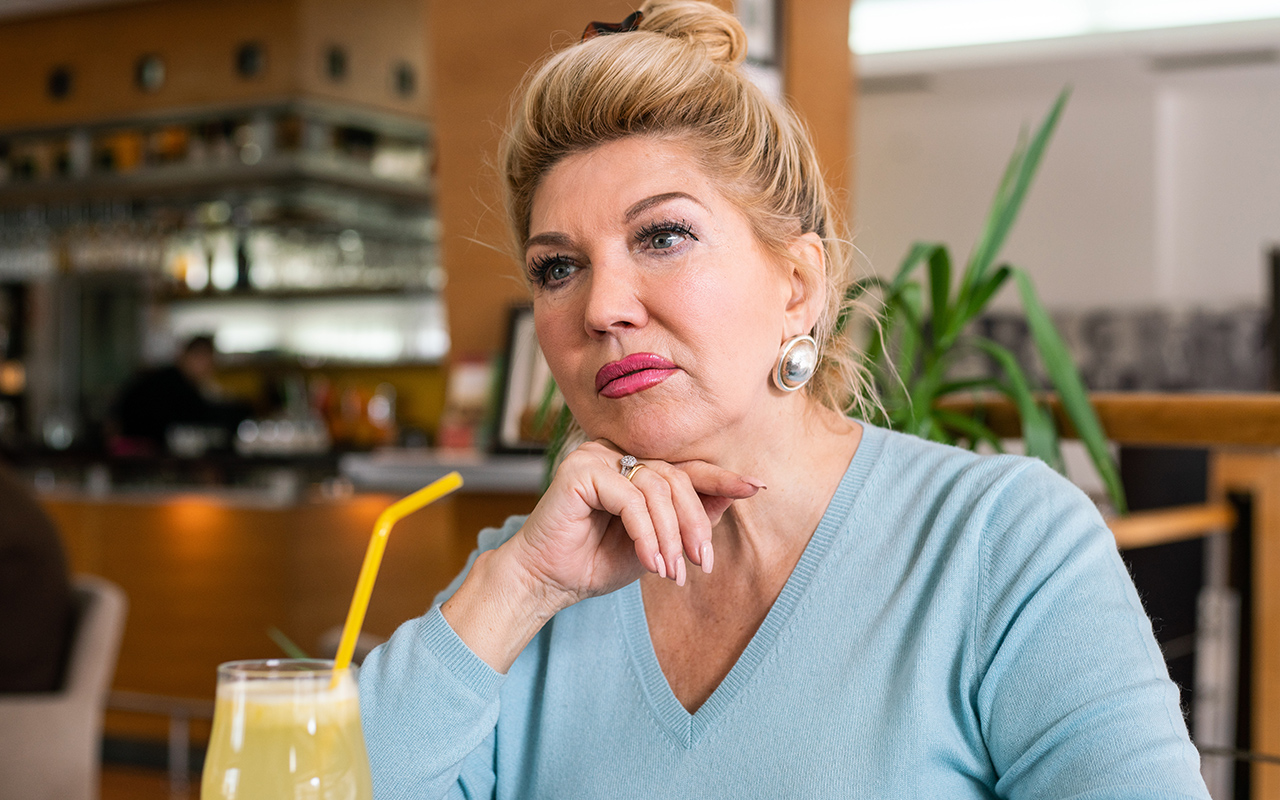
Where else have you performed?
We also performed with poets such as Dobrica Eric around Belgrade, in culture centers. The poet would recite their lyrics and we’d play music. One time we came and all the seats were empty. What happened?
It turned out that one farmer’s cow was giving birth and there were complications. We waited for it to be over and had the poetry evening in a barn. It was so nice, I think the new calf and its mom were happy too. :)
Those were the high-school days.
As soon as you graduated high school you started going on tours.
Back then the music scene, concerts, tours all worked through state agencies. I was an exclusive on Belgrade’s music scene where there was discipline, order and work. You’d get your monthly schedule and you weren’t allowed to perform anywhere else. Tozovac, Lepa Lukic, Miki Jevremovic and many others were also exclusives and we all trembled when we would come before Rade Mumin who was the director and a former military officer. When he shouts and slams his fist on the table we’d all stand at attention.
I traveled a lot to perform, which is why I missed out on partying, falling in love, going to weddings, graduation parties...but I don’t regret anything. I always loved travelling and I still do.
I remember in 84’ or ’85 when I bought my first car “Zastava Mediteran” and immediately as a fresh driver went on tour with “Sedmorica mladih” with whom I performed. I took three models with me in the car too. Rain, sun or fog it didn’t matter – you had to be there on time.
It was a big Yugoslavia back then and it would happen that I have a concert at the Home of Guard at 12PM, then drive to Bjeljina for an afternoon concert and the straight to Tuzla to an evening party. After that it’s back in the car and off to Belgrade.
I would sometimes get home, sit on the nearest chair and start crying from exhaustion. Still I was young and it didn’t hit me too hard.
There were all sorts of mishaps. One time I got on a plane to Sarajevo for a shoot when suddenly I heard on the speakers “We will be landing in Zagreb at blah blah”. We were all stunned – we were going to Sarajevo, what was this about Zagreb?
“We had to pick up some passengers in Zagreb”, they tell us so we’ll soon be on our way to Sarajevo. I’m late, there weren’t mobile phones, we were all anxious, hungry and thirsty and out came that Yugoslavian solidarity of that time. Everyone had a bit of food or drinks – a pie, a biscuit or a snack and they brought it all out to share with everyone. Within minutes we were having a buffet in the airplane. Finally, when we got to Sarajevo my shoot was already over so I had to get back on the plane and go home, but the trip was amazing.
An interesting fact is that three presidents have attended your performances: Josip Broz Tito, Slobodan Milosevic and Boris Tadic.
In 1979 I was at Law school waiting for my class to start. Two men in raincoats came in and said “Good day. Suzana Mancic? Come with us.”
They said they’re with the service and were taking me to Tara “Your mother already packed your things”.
When we got there, there was tension in the air while we waited for the Marshall. At first I held up fine – I’d never suffered from stage fright and I acted professionally. But that all changed before the performance.
It was a small hall where Tito sat with his entourage and royal poodles that wouldn’t stop barking. He was visibly in a foul mood, probably in pain back then, and that had a big impact on the atmosphere and myself. So much so that the entire dress I was wearing was fluttering because I was shaking so badly.
Broz left right after the program was over and as it turned out was admitted to the hospital a few days after.
I performed for Milosevic in the Home of Guard. He was there with some guests sitting at a long table and we performed on a small stage. It was back in 89’ or 90’, the war still hadn’t begun.
As for Tadic, we met during some event. After introductions, he said “I remember you from when you sang at Masinac, I listened to you” so in a way I performed for him too.
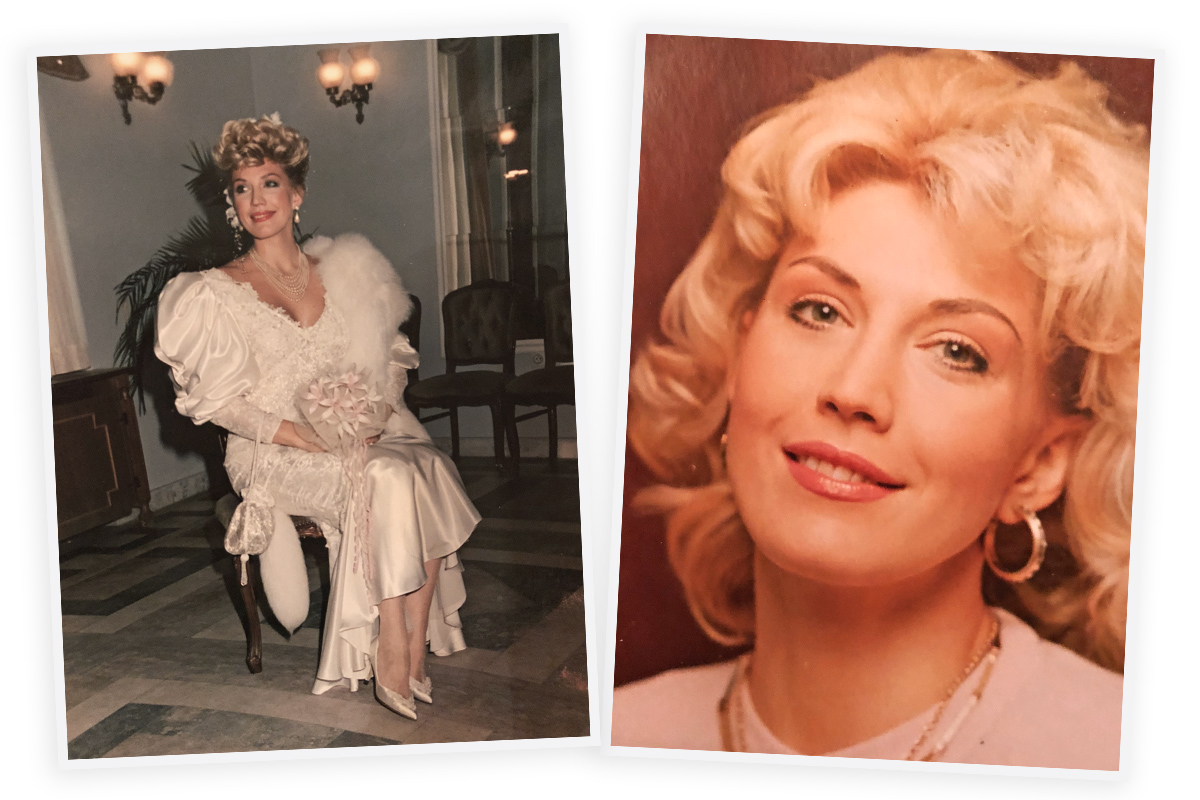
You made the first ever break in your career when you moved to Bagdad for a year. Why did you go and what was it like to come back?
I was young, I fell in love and I left. I spent a year there and didn’t leave the house. I had a German lady for a neighbor whose husband was a consul and we had a beautiful friendship. We’d get into her car, go for a ride, go shopping. When she started working it was my darkest day. Nobody had any time for me and I didn’t go anywhere.
After a year there was no more love left and I started wondering what I was doing in that war-ridden part of the world. I remember phantoms flying above, the bombing of Dora. I decided to come back.
At first I tried to graduate from college, but once you lose your work habit it’s hard to get it back.
Around that time I applied for the position of a TV announcer. They were pretty girls who’d talk about what’s coming up on the program before or after the show. We all had to go through a period working with Stevo. I remember the first thing he asked me was where I was from. I say I’m from Belgrade and he says “I’m not asking that, I mean where’s your pop from”. I say he’s from Pirot and he goes “Good grief, I’ll have trouble with you”. But what he neglected to ask was where my mother was from, and she was from Valjevo and always insisted on proper speech. She even sorted out my father but she couldn’t make him say “zelezara” and “ogledalo” properly.
Thanks to my mom, it was easy for me to do the announcer job and I even would get to read the latest news at 1AM when the presenter would fail to show up. It was there that I learned the ropes of being a TV host which I later did and found this experience invaluable.
And then the turnaround came.
Yes that fateful call came in. It was from Boris Kostov and Zoran Cvetanovic, my school friends who worked for TV Belgrade.
They offered me the job of hosting the lottery broadcast. They said that all I had to do was pull out the balls. But still saw myself as a star. I couldn’t stay quiet and dull.
Even though the lotto draw lasted only 5-7 minutes, I still saw myself as a sort of a host of that program, and not just someone who just smiles in silence. I insisted on that.
They told me they couldn’t give me a mic because the drum was so loud next to me.
“People went to the Moon and you can’t give me a mic, please.” I persisted and they eventually agreed. They couldn’t wire me for the very first episode since it had to go tomorrow, but the next one was the way I wanted.
That’s the origin story of the “Lotto girl”
When that madness started, my popularity rose so much I could pick and choose what I’d film. They would cast me in popular movie comedies – “Zikina dinastija”, “Cao inspektore”... I was a frequent guest in any TV centers for New Years programs or promoting new records. Sometimes I’d take up three front pages in a day – in Zagreb, Sarajevo and Skoplje. There was no empty airtime and the market was huge.
Still, all that work had pretty poor pay. Lotto almost wasn’t enough to take a taxi. But when that all started, nobody could anticipate where I’d work and I worked everywhere and earned enough for everything I needed. Thanks to lotto I could afford travels for myself and my mother but I also had the opportunity to use my talents and work in things that interested me.
In all of that my mom was my best manager. Whenever she negotiated my jobs she’d get a better price than if I’d done it myself.
Still, you never let your fame go to your head, as they say.
I kept my feet on the ground all thanks to a movie I once saw as a teenager – General Patton. The movie ends with him standing in a field and the narrator talked about how Roman emperors, upon returning from successful conquests where everyone praised and celebrated them, would always have a slave whisper in their ear that fame is passing. This is why I always kept in mind that I don’t know how long my popularity will last and what will I do when my time passes. I always had to have a plan B, which is why I graduated university. I’m also a good driver and I can be a taxi driver if needs be.
There are many today who try to imitate what you did as the Lotto girl. Do you find it flattering?
Oh yes. :) I only did lotto for four years before I could no longer stand getting stopped in the street and asked over and over “What will happen on Tuesday? Is it rigged? Let’s make a deal so that I win”.
I saw myself as an artist, singer who is worth more than those five minutes. That’s why I decided to move on from there.
Being known as the ‘Lotto girl’ bothered me back then, but today it warms my heart when they announce me as ‘our Lotto girl’. It’s a trademark of mine of sorts, even if I couldn’t have one in music.
I was always pushed ahead by a certain curiosity to try new things and see if I can do it. This always stopped composers from giving me the best song. Today maybe people wouldn’t see it that way, maybe I was the first to be so multi-media oriented which back then wasn’t really understood well.
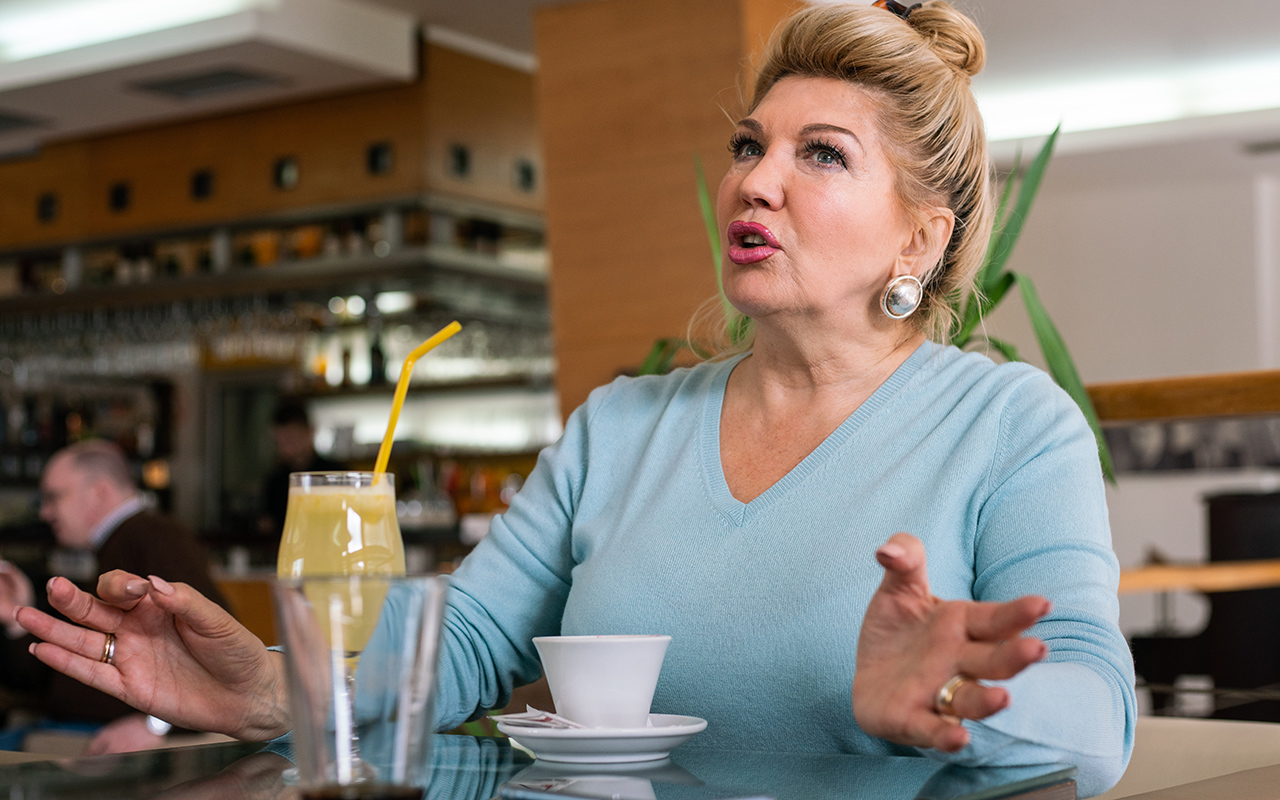
How did things develop after the lotto?
The first thing I did was I cut my hair. I recorded a phenomenal long-play with Sasa Popovic and Dragan Aleksandric’s songs. They were newly composed songs, but to me they were amazing. The song “Leptirica” is from that album.
After that things just rolled out – being a host, singing, work, performing around Yugoslavia. In 1989 I married Nebojsa Kunic, the Gargamel from “Sedmorica mladih”.
We’d been working together for 10 years and one day I just happened to look at him when we returned from a tour, see him in a new light and I fell in love.
Back then Dunja Lango, the editor of the entertainment program, called me in to open the morning program time-slot on the second channel of TV Belgrade. It was supposed to run between 8AM – 10AM. I asked her who watches TV that early and she said ‘It shows that you don’t have children’. People wake up early and immediately turn on the TV and it can be interesting.
Since I’d just gotten married I asked her what we would do if I got pregnant. She said not to worry, she’d just film me above the belly in that case. :)
And that’s how it went until 1992. At the same time I performed throughout the country, but only under the condition that on Saturday evenings I had to leave any venue I was performing at by midnight so that I’d be ready for the morning program. One time my husband drove me from Herceg Novi to Belgrade to make sure I was in Abardareva street for makeup by morning. That was my life, nothing was too hard for me.
Then came a new pause in your career when you had your child.
I went through several failed pregnancies that ended badly at the city hospital in Zvezdara. That was when my godfather, a doctor, told me that the only way I could have a child was if I stayed at home and maintained my pregnancy properly. And that is what I did.
I went to bed in April and didn’t get up until December.
That was the second ever break I took from my career.
Before I started maintaining my pregnancy there was already the first frontline. I cooperated with the military throughout my career, we’d go and put on concerts for our volunteers at the halls five kilometers away from the gunfire. I remember I was singing “Djurdjevdan” and both me and the audience were crying. I couldn’t take it anymore, that was when I said I couldn’t do it.
Luckily I got pregnant so it all tied up neatly.
However after I gave birth I had a 2 month old baby and the armed forces General Staff calls me. They congratulate me on the new baby and asked me to come to Pale in helicopter. I had to decline. I said please no, I just gave birth imagine if anything happened.
By then the sanctions were in full swing, stores were empty, there were no diapers.
My husband at the time started working for Biomedicina. They started an offshore company in Cyprus and we decided to move there. We found an amazing sanctuary there from the dramatic, suffocating wartime environment. Everything was relaxed and without any danger for my child whom I could take on walks along the seaside and feel safe.
Then you move to Moscow
It was there I gave birth to my second daughter and learned Russian. Serbia was still in poor standing internationally when the first humanitarian concert took place at our embassy. The diplomat core was there, economy representatives from around the world and I hosted the program in Russian, English and Serbian and was very proud of myself.
The Serbo-Russian society was very active then and once when I performed there I sang “Tamo daleko” and everyone stood and put their hands on their hearts. I couldn’t finish the song because I was in tears. I still choke up thinking about it.
There were those moments when your country, your people and your city were suffering and there was no end in sight and you’re far away. In the end we went back because we couldn’t take it anymore.
What was it like to go back?
I was gone for six years and I thought that everyone had forgotten me. But surprise, people would come up to me in the street and go “Wow, Suzana Mancic!” It became clear to me that people did remember me and that there was a place for me here yet.
Music had changed completely. From newly-composed they’d crossed to techno-folk, something I didn’t quite understand. But there were also many new TV stations and I saw my chance to get back to the scene as a show host.
It just so happened that Sasa Popovic called me then and I started hosting ZAM with Vanja Bulic. There we had a running joke involving my laughter when they’d tune back in with us after a commercial break and I was laughing because he told me jokes during the break.
When we started working together, there came gossips around the city how Vanja and I were involved. We didn’t pay much mind to hearsay until one day his wife went to a hair stylist. Another woman was looking through a magazine and without knowing that she was sitting next to Vanja’s wife she started making comments. His wife laughed it off, but Vanja then called me and said “Listen pretty girl, this is becoming serious. Let’s all of us take a picture together and end all the gossip.” And that’s what we did. From then on I became not only Vanja’s coworker, but also good friends with him and his family. I can’t imagine Easter without some kind of family time spent together. He gets along great with my husband Simeon and it really warms my heart.
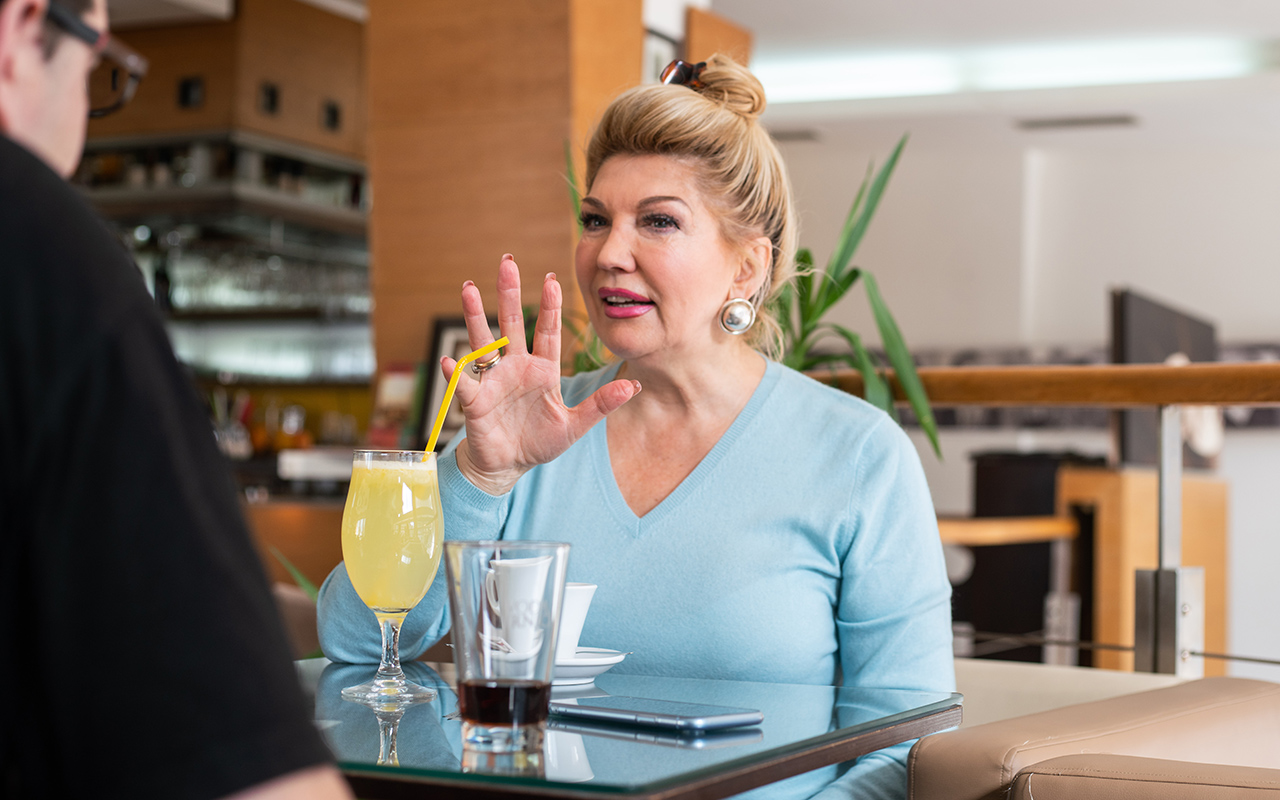
What do you love about Belgrade and what do you feel it’s missing?
Belgrade must’ve been so beautiful before WWII. It was badly damaged by the war, the poverty during the 90’s, the inconsiderate citizens...it all left a trace. It needs to have its face washed.
In Belgrade I love the rivers on the Zemun side, Avala, Topcider, Kosutnjak, Pionir park where I grew up. There are directions I like to drive in even though it’s the longer way around. I love the Literature club where my parents took me when I was a child and where I went later with my friends. It was my honor to see actors, writers, painters – they were all there. One summer I took my children there after a kids’ ballet show. I told them that once Ivo Andric sat right there and Mesa Selimovic walked those stairs so my kids go there to this day. I love the fact that I live in the heart of the city where it’s never quiet, day or night.
I am overjoyed that the National museum is open. Generations have grown up never knowing what the National museum is and that national identity. I’m happy we have worldwide artists visit, that we have good performance halls, the Arena and the Syndicate Home that’s now brand new.
We need to understand that this is our city and we should take care of it.
For Belgrade I would like that the Clinical center finally gets finished and those seven floors that ring empty in their gray zone. It’s very important for our city and the entire country.
I live in two locations, in Belgrade and Greece, but this is my home and I can’t imagine life without Belgrade. This is where I have my friends, my memories – something happened in almost every corner. I know the wall where I had my first kiss, the place where I bumped my car for the first time or where I met someone. That’s why I wish Belgraders would take better care of Belgrade.
For four years now you’ve hosted your author show “Suzana’s choice” that airs on KCN and BN TV. In addition, you’ve written a two-part biography. Do you plan on writing any more books?
My childhood is tied to Valjevo and Pirot. My grandma Mancic was adopted during WWI by a family with no children and my nana Gina from Valjevo had the same fate. These are amazing stories. Captivity, victims, Bregalnik battle, Pirot between the two wars. Writing about that area and the lives of these women while their husbands were on the frontlines or imprisoned is interesting to me. There could be a fantastic story there, but it requires a lot of research and conversations with military historians. Still, it’s something I plan to do.




 6 ℃
6 ℃

